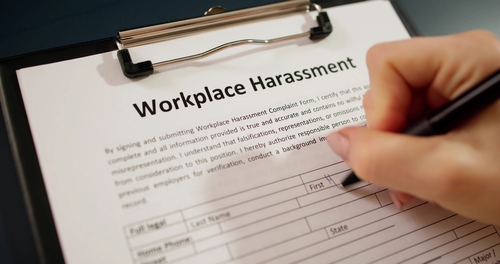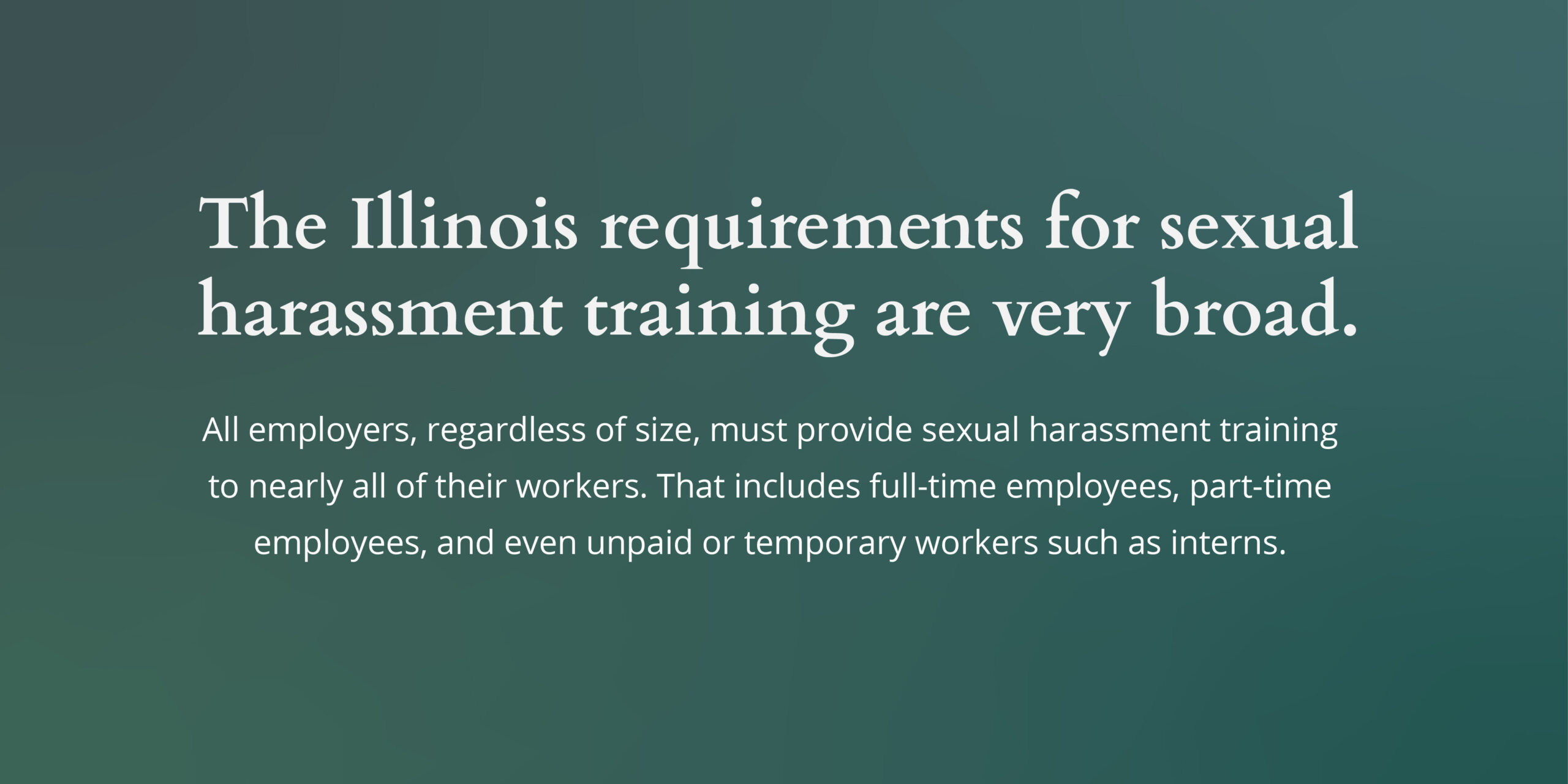Staying in Compliance with Illinois Sexual Harassment Training

Employers around the country must comply with laws that prohibit discrimination in the workplace, including sexual harassment. In addition, a number of states have passed laws specifically requiring employers to institute sexual harassment training for their employees on an ongoing basis.
Illinois is one such state, and in fact has amongst the most comprehensive sexual harassment training requirements in the country. In order to stay in compliance with Illinois employment laws, it is essential that employers educate themselves on the sexual harassment training requirements, put in place a compliance plan, and execute it. An experienced Naperville, IL business law attorney can advise your business to ensure compliance with Illinois sexual harassment training requirements.
What Is Illinois’ Law on Sexual Harassment Training?
The Illinois Human Rights Act (IRHA), which is administered by the Illinois Department of Human Rights (IDHR), makes it a civil rights violation for an employer to engage in sexual harassment. Section 101-0221 of that law requires employers working in Illinois to provide sexual harassment training to their staff every year.
Why Does Illinois Require Sexual Harassment Training?
Illinois requires employers to provide yearly sexual harassment training to counter the presence of sexual harassment in workplaces. According to the state, when businesses tolerate sexual harassment, it can have a negative effect on the workplace and create a hostile work environment, reduce productivity, and lead to legal issues.
Who Must Receive Sexual Harassment Training in Illinois?
The Illinois requirements for sexual harassment training are very broad. All employers, regardless of size, must provide sexual harassment training to nearly all of their workers. That includes full-time employees, part-time employees, and even unpaid or temporary workers such as interns.
Although the law does not explicitly require that employers provide sexual harassment training to independent contractors, the IDHR strongly recommends that businesses train independent contractors as well.
Additionally, employers must ensure that they provide training to employees even if they do not speak English or have disabilities, while tailoring the training to ensure it is accessible to all.

What Must the Sexual Harassment Training Include?
The sexual harassment training that employers provide must, at a minimum, include:
- An explanation of Illinois sexual harassment law.
- Examples and definitions of the type of conduct that would be considered sexual harassment.
- A summary of relevant state and federal statutes related to sexual harassment. Specifically, this summary must outline the remedies available to victims of sexual harassment.
- A summary of employers’ responsibilities to prevent, investigate and correct sexual harassment in the workplace.
Employers may use the model sexual harassment training provided by the state of Illinois, but they are not required to do so. They may develop this training on their own, or hire one of the many third parties that provide this training, keeping in mind that IDHR does not certify such third parties.
When Must Employers Provide Sexual Harassment Training?
Employers must provide sexual harassment training yearly by December 31. Although not required, IDHR encourages employers to train employees as soon as possible after they are hired because employers may be liable if their new hires engage in sexual harassment.
Even if a new hire completed this training for the year at their prior place of employment, the IDHR also recommends that employers provide the training when the employee begins their new employment. An employer may request proof that a new hire has completed the sexual harassment training at their prior place of employment, although the employer (not the employee) is responsible for ensuring that this prior training complies with the sexual harassment training obligations.
What Are the Requirements for Restaurants and Bars?
Restaurants and bars are subject to additional requirements when it comes to sexual harassment training. In addition to following the sexual harassment training guidelines applicable to all businesses, restaurant and bar training must at a minimum include:
- Specific behavior and activities related to the restaurant and bar industry.
- An explanation of a restaurant or bar manager’s legal liability and responsibility regarding sexual harassment
- Options in English and Spanish
Employers operating restaurant or bar businesses must additionally set up a sexual harassment policy and provide a copy of this policy to all employees. At a minimum this policy should contain the following:
- A prohibition against sexual harassment
- The definition of sexual harassment under state and federal law
- Detailed information about how someone may report sexual harassment internally
- Information prohibiting retaliation against someone who reports sexual harassment
- A requirement that all employees take sexual harassment training
Must Employers Provide Sexual Harassment Training to Remote Workers?
Employers should provide sexual harassment training to employees who work or will work in Illinois, even if they are not based in the state. So long as an employee regularly interacts with an Illinois employer, that employer should provide them with sexual harassment training.
What Are the Penalties for Failing to Provide Sexual Harassment Training?
Employers who do not provide sexual harassment training in accordance with the legal requirements could face penalties. Employers with less than four employees could be fined up to $500 for the first offense, $1000 for the second offense, and $3000 for each additional offense. Employers who have four or more employees could be fined up to $1000 for the first offense, $3000 for the second offense, and $5000 for each additional offense.
In addition, there could be reputational consequences if potential employees or competitors become aware of the company’s failure to comply. The IDHR encourages employees to inform it if an employer is not in compliance with sexual harassment training requirements.
What Documentation Must Employers Keep?
Employers must keep a record of each training that they have conducted, either as a certificate of completion or employee acknowledgment. These can be either in physical or electronic format.
Call a Naperville, IL Business Law Attorney
At the Gierach Law Firm, we represent businesses to ensure compliance with applicable laws. Additionally, Attorney Denise Gierach has many years of experience counseling her clients on business law best practices. Employers must ensure that they comply with Illinois’ sexual harassment training requirements. If you are concerned about ensuring that your business complies with Illinois’ sexual harassment training law, call the experienced Naperville, IL business law attorney at 630-756-1160 for a consultation.
Practice Areas
Archive
+2018
+2016
Please note: These blogs have been created over a period of time and laws and information can change. For the most current information on a topic you are interested in please seek proper legal counsel.














